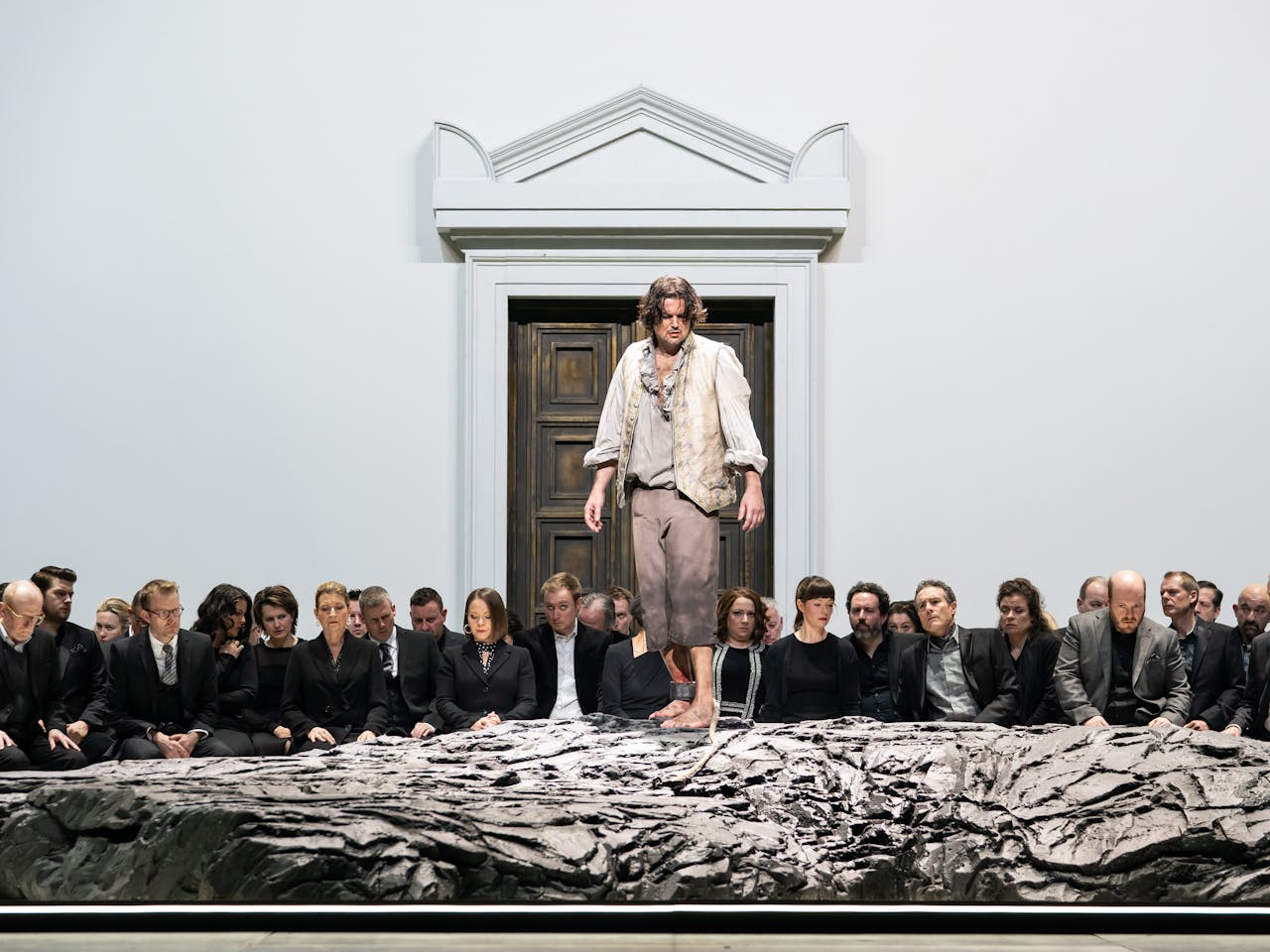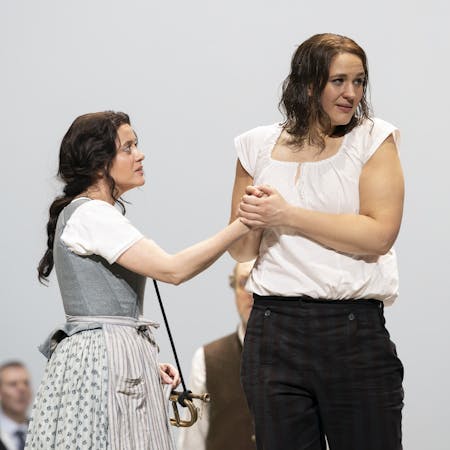Fidelio
Fidelio
Fidelio
A young woman embarks on a daring mission to rescue her husband.

Resistance, revolution and love against the odds in Beethoven’s only opera.
Resistance, revolution and love against the odds in Beethoven’s only opera.
Royal Ballet and Opera Principal Julia Rausing Trust
A TALE OF TWO HALVES

Disguised as ‘Fidelio’, a young woman embarks on a daring mission to free her husband, who has been wrongly imprisoned. But as time begins to run out – and the jailer’s daughter falls in love with her – Fidelio’s hidden identity and her husband’s fate are put in sudden peril.
Background
What begins as a domestic drama turns into a bold exploration of freedom, gender and the power of love. Tobias Kratzer’s production combines revolutionary flair with a sharp, contemporary edge, asking the question: when does political inaction turn into complicity? Former Jette Parker Young Artist Jennifer Davis stars as the bold and independent Leonore (‘Fidelio’). Davis is joined by Eric Cutler as Florestan, Peter Rose as Rocco and Christina Gansch as Marzelline. Alexander Soddy returns to conduct.
A revolutionary tale
When Fidelio had its premiere at the Theater an der Wien in 1805, Napoleon’s army was occupying the city. The aftershocks of the French Revolution were felt across Europe long after the 18th century, and questions of personal freedom, social justice and the rights of the individual continued to resonate.
Kaleidoscopic musical forms
In Beethoven’s only opera, we witness the composer at his dramatic finest. The music is transcendent throughout and includes the famous Act I Quartet, the Prisoners’ Chorus and Florestan’s impassioned Act II cry in the darkness and vision of hope. The opening duet between Jaquino the jailor and his daughter Marzelline is sung in the style of Singspiel (song interspersed with spoken dialogue), while the hymn-like Prisoners’ Chorus at the finale of Act II recalls Beethoven's most transformative Oratorio (sacred) work. It took Beethoven 12 years to complete the score, and the result is a powerful drama which ambitiously challenges formal musical structure and grows in scope as the story progresses.
The Prisoners' Chorus
At the end of Act I, the prisoners are released from the darkness of their cells. Under the penetrating rays of the sun, prisoners and audience alike are reminded of the transformative effect of freedom on the human spirit. ‘O welche Lust,’ the men cry out: ‘Oh what joy, to be in the open air, to breathe freely once more. Up here is life, down below in the dungeon is death.’ It is these steps into the light that imbue, if briefly, the imprisoned with hope, indeed joy – before they must soon return to the cold and fearful depths of their cells, and of the human mind.
Based on a true story...
In 1803, just two years before the premiere of Fidelio, Beethoven composed his Eroica symphony, dedicating it to Napoleon Bonaparte. When in 1804 Napoleon declared himself Emperor, Beethoven withdrew the dedication in disgust. It should come as no surprise, then, that the theme of freedom is so important to Fidelio, whose plot follows a young, independent woman as she attempts to free her husband who has been wrongly imprisoned. Beethoven based his opera on a true story from the French Revolution, and a real-life rescue that took place in the city of Tours.
Cast and Creatives
Creatives

Access
There is lift access and step-free routes to over 100 seats in the Stalls Circle, Balcony and Amphitheatre. There are 10 steps or fewer to some seats in the Stalls Circle, Balcony, Amphitheatre and the Donald Gordon Grand Tier. All seats in the Orchestra stalls are accessed by 9 steps or more. A handheld bell is rung by Front of House staff to signal guests to take their seats before a performance. The bell is loud and can be startling. The bell is rung approximately ten minutes before the show starts and at each interval.
We have an assistive listening system available to use. The opera is sung in German with English surtitles. Captions and translations in English will be displayed on screens above the stage and around the auditorium. There is one gunshot in Act II of this production.
An audio description of Fidelio, including in depth guides to Act I and Act II, is available on our SoundCloud.
Join our Access Scheme for priority access performance tickets and to personalise your account for your access requirements.

Donate
The Royal Ballet and Opera is a charity and relies on your support. No matter the size, every gift is critical to our work and helps us to secure the future of ballet and opera.
Your donation will enable us to keep extraordinary work on our stages, inspire the next generation and support the Royal Ballet and Opera's community of artists, technicians and craftspeople.
Culture, crafted by contribution
Royal Opera House Covent Garden Foundation, a charitable company limited by guarantee incorporated in England and Wales (Company number 480523) Charity Registered (Number 211775)
